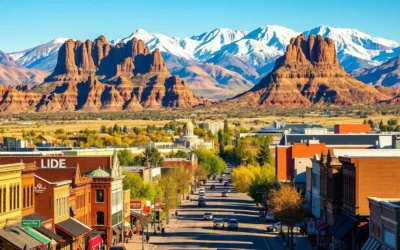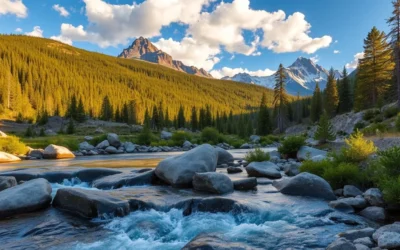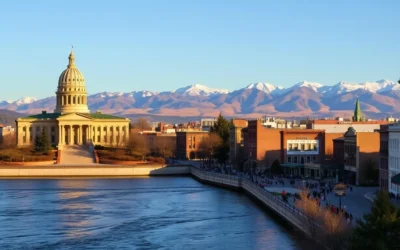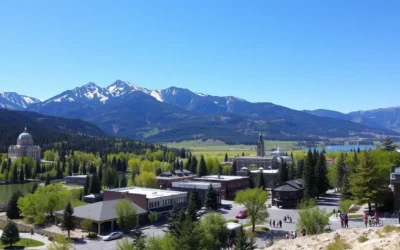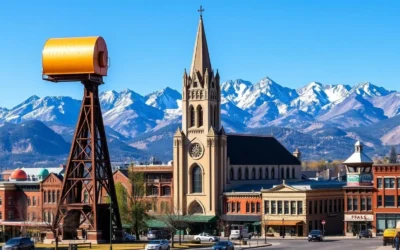Nestled in the heart of northwestern Montana, lies a breathtaking natural wonder often referred to as the “Crown of the Continent.” With over 1 million visitors annually, Glacier National Park is a must-visit destination for outdoor enthusiasts and nature lovers alike.
This stunning park boasts turquoise-blue alpine lakes and rugged mountain peaks, offering a diverse range of landscapes that are teeming with wildlife. As you plan your visit, it’s essential to understand the park’s unique geography and the importance of vehicle reservations due to its popularity.
With its unparalleled natural beauty, Glacier National Park promises an unforgettable adventure. Discover the top experiences that make this park a standout among America’s national treasures.
Discovering the Crown of the Continent
Glacier National Park, often referred to as the ‘Crown of the Continent,’ is a paradise for nature lovers and adventure seekers. This stunning national park in Montana offers a diverse range of landscapes, from alpine meadows to glacial lakes and towering mountain peaks.
Park Overview and Geography
Glacier National Park covers over one million acres of pristine wilderness, featuring alpine lakes, glaciers, and towering mountain peaks. The park’s diverse geography is characterized by the Continental Divide, which runs through it, creating a dramatic landscape of valleys and peaks. The park is also home to a wide variety of wildlife, including grizzly bears, mountain goats, and elk.

The park’s unique geology is a result of millions of years of tectonic activity, glaciation, and erosion. The result is a breathtaking landscape that is both beautiful and fragile. Visitors to the park can explore its many trails, lakes, and scenic drives, taking in the stunning beauty of this unspoiled wilderness.
| Geological Feature | Description |
|---|---|
| Glaciers | Remnants of the last ice age, these glaciers are a key feature of the park’s landscape. |
| Alpine Lakes | Pristine lakes formed by glacial activity, offering serene and picturesque scenery. |
| Mountain Peaks | Towering peaks that offer challenging hiking trails and breathtaking views. |
Best Time to Visit Glacier National Park
The best time to visit Glacier National Park depends on your preferences and what you want to do. Generally, the park is open year-round, but the accessibility of certain areas and facilities varies with the seasons.
Going-to-the-Sun Road, a major attraction, is typically open from late June to early October. The peak tourist season is from mid-June to mid-September, with July and August being the warmest months. If you prefer fewer crowds, consider visiting in September when the fall colors are beautiful, and the weather is still mild.
- Understand that mid-June through mid-September is generally considered the best time to visit, when most facilities and roads are open.
- Learn about the seasonal opening of Going-to-the-Sun Road, which typically opens in late June/early July and closes by late September or early October.
- Consider visiting in July and August for the warmest temperatures and best hiking conditions.
- Discover the benefits of a September visit when fall colors emerge and crowds thin out.
- Understand that winter visits offer a completely different experience with opportunities for cross-country skiing and snowshoeing.
Planning your trip to Glacier National Park according to the season will help you make the most of your visit, whether you’re interested in hiking, wildlife viewing, or simply taking in the breathtaking scenery.
Essential Planning Information for Glacier National Park
Planning a trip to Glacier National Park requires more than just picking a date; it demands careful consideration of several essential factors. To ensure a smooth and enjoyable trip, it’s crucial to be well-prepared with the right information.
Vehicle Reservation System and Entry Requirements

Glacier National Park has implemented a vehicle reservation system to manage the number of visitors during peak season. It’s essential to understand the entry requirements and plan accordingly. The reservation system helps to reduce congestion and ensures a more enjoyable experience for all visitors.
To make a reservation, you can visit the official Glacier National Park website or use the park’s mobile app. Be sure to check the specific dates and times when reservations are required, as they may vary depending on the season.
Park Fees and Operating Hours
Understanding the park fees and operating hours is vital to planning your trip. Glacier National Park charges an entrance fee, which varies depending on the type of vehicle and the duration of your stay. The park’s operating hours also vary, so it’s crucial to check the official website for the most up-to-date information.
The park is generally open year-round, but some facilities and roads may be closed during the winter months due to weather conditions. Be sure to plan your visit according to the park’s operating hours and your interests.
How Many Days to Spend in Glacier
Ideally, plan on spending a minimum of two days at Glacier National Park. With one day, you can drive Going-to-the-Sun Road and visit the sights along the drive. With two days, you can follow the one-day recommendation and spend the second day in Many Glacier, hiking one of the trails.
- Understand that a minimum of two full days is recommended to experience Glacier National Park’s highlights.
- Plan for at least 3-4 days if you want to explore beyond Going-to-the-Sun Road.
- Consider a 5-7 day trip if you want to thoroughly explore the park.
By planning your time wisely, you can make the most of your trip to Glacier National Park and enjoy the various hikes and activities it has to offer.
Going-to-the-Sun Road: The Ultimate Scenic Drive

Going-to-the-Sun Road, Glacier National Park’s signature scenic drive, promises an adventure of a lifetime with its unparalleled natural beauty. Spanning 50 miles, this road is not just a pathway through the park; it’s an experience that encapsulates the essence of Glacier National Park’s majestic landscapes.
Road Regulations and Opening Dates
Before you embark on your journey along Going-to-the-Sun Road, it’s crucial to be aware of the road’s regulations and opening dates. The road typically opens in late June or early July, depending on snow conditions, and remains open until mid-October. Vehicle reservations are required during peak season to manage traffic and ensure a smooth experience for all visitors.
Best Viewpoints Along the Drive
As you drive along Going-to-the-Sun Road, you’ll encounter numerous breathtaking viewpoints. Logan Pass, the highest point on the road, offers stunning vistas and access to hiking trails. Other notable stops include Bird Woman Falls and Jackson Glacier Overlook, each providing unique perspectives on the park’s diverse landscapes.
Tips for Driving Going-to-the-Sun Road
To make the most of your drive, consider the following tips:
– Start early in the morning to avoid traffic and secure parking.
– Plan for at least 2-3 hours for the drive without stops, but ideally allocate a full day.
– Ensure your gas tank is full before entering the park.
– Be prepared for changing weather conditions.
– Drive slowly and use pullouts to let faster vehicles pass.
By following these guidelines and being mindful of your surroundings, you’ll be able to fully appreciate the beauty of Going-to-the-Sun Road and create lasting memories of your visit to Glacier National Park.
Logan Pass: The Crown Jewel of Glacier National Park

As the crown jewel of Glacier National Park, Logan Pass offers an unforgettable experience with its stunning vistas and diverse wildlife. Located at an elevation of 6,646 feet, it is a pivotal point in the park, attracting visitors from all over the world.
Continental Divide and Wildlife Viewing
Logan Pass is situated on the Continental Divide, making it an ideal location for observing a wide range of flora and fauna. The area is renowned for its abundant wildlife, including grizzly bears, mountain goats, and bighorn sheep. Visitors can enjoy wildlife viewing opportunities while taking in the breathtaking scenery.
The unique alpine environment of Logan Pass supports a variety of plant species that are adapted to the harsh, high-altitude conditions. This makes it a fascinating spot for botany enthusiasts and nature lovers.
Parking Tips and Visitor Center Information
One of the challenges visitors face at Logan Pass is parking. The parking lot is notoriously difficult to find a space in during peak season, often filling by 8:30 am. To secure a parking spot, consider arriving before 7 am or after 4 pm when day visitors begin to leave.
The Logan Pass Visitor Center is a valuable resource for visitors, offering ranger programs, exhibits about the alpine environment, and restroom facilities. It’s an excellent place to gain insights into the area’s ecology and history.
For those who prefer not to drive, the park shuttle system is an alternative way to access Logan Pass. However, be aware that there may be wait times, so plan accordingly.
Before heading to Logan Pass, it’s essential to prepare for limited cell service throughout much of Glacier National Park. Downloading maps and information in advance can help navigate this beautiful but remote area.
Best Day Hikes in Glacier National Park
Day hiking in Glacier National Park is an adventure like no other, with trails ranging from easy strolls to challenging climbs. Whether you’re a seasoned hiker or just looking for a leisurely walk, Glacier National Park has something to offer.
Easy Trails for All Skill Levels
For those looking for easier hikes, Glacier National Park has several options that are perfect for families or those who want to enjoy the scenery without too much strain.
Trail of the Cedars
The Trail of the Cedars is a short, easy loop that’s great for all ages. This 1-mile trail takes you through a forest of ancient cedars and hemlocks, providing a serene and peaceful hiking experience.
Hidden Lake Overlook
The Hidden Lake Overlook trail is a moderate 2.5 miles round trip, but it’s considered easy to moderate due to its well-maintained path. The trail offers stunning views of Hidden Lake and the surrounding mountains.
St. Mary Falls
The St. Mary Falls trail is a 1.7-mile out-and-back hike that leads to a beautiful waterfall. This easy trail is suitable for families and is a great introduction to hiking in Glacier National Park.
Moderate to Challenging Day Hikes
For those seeking more adventure, Glacier National Park offers several moderate to challenging day hikes that reward hikers with breathtaking views and unforgettable experiences.
Avalanche Lake
The Avalanche Lake trail is a 4.5-mile out-and-back hike that takes you through a lush forest and ends at a picturesque lake. This trail is considered moderate due to its length and some elevation gain.
Apikuni Falls
The Apikuni Falls trail is a 4.2-mile out-and-back hike that features a beautiful waterfall at its endpoint. The trail is considered moderate due to its distance and some rocky terrain.
Johns Lake Loop
The Johns Lake Loop is a 2.0-mile easy and relatively flat loop trail on the west side of Glacier National Park. This trail offers a peaceful hiking experience, with diverse ecosystems and the opportunity to see McDonald Falls.

| Trail Name | Distance (miles) | Difficulty |
|---|---|---|
| Trail of the Cedars | 1 | Easy |
| Hidden Lake Overlook | 2.5 | Easy/Moderate |
| St. Mary Falls | 1.7 | Easy |
| Avalanche Lake | 4.5 | Moderate |
| Apikuni Falls | 4.2 | Moderate |
| Johns Lake Loop | 2 | Easy |
Epic Full-Day Hiking Adventures in Glacier
For hikers seeking an epic experience, Glacier National Park has several trails that stand out. The park’s diverse terrain offers a range of hiking options, from challenging climbs to scenic strolls. In this section, we’ll explore three of the most remarkable full-day hiking adventures you can embark on within the park.
Highline Trail

The Highline Trail is a thrilling adventure that takes you along the Garden Wall, offering breathtaking views of the surrounding landscape. This challenging trail is approximately 7.6 miles round trip, with an elevation gain of around 800 feet. As you hike, you’ll be treated to stunning vistas of glaciers and alpine lakes.
The trail is known for its exposed sections, so it’s essential to be comfortable with heights. The reward is well worth the challenge, as the scenery is truly unforgettable.
Grinnell Glacier Trail

The Grinnell Glacier Trail is a 10.3-mile round-trip hike that takes you to the foot of Grinnell Glacier. This strenuous trail involves an elevation gain of over 1,600 feet, making it a challenging but rewarding experience. Along the way, you’ll pass through lush forests and alpine meadows, with the glacier serving as a stunning endpoint.
As you hike, keep an eye out for wildlife, including grizzly bears and mountain goats. The trail offers spectacular views of Grinnell Lake and the surrounding peaks.
Iceberg Lake Trail

The Iceberg Lake Trail is a 9.6-mile round-trip hike located in the Many Glacier area. This strenuous trail involves a moderate 1,200-foot elevation gain, making it accessible to reasonably fit hikers. The trail shares its first 2.7 miles with the Ptarmigan Tunnel trail, allowing you to see Ptarmigan Falls before the trails diverge.
As you reach Iceberg Lake, you’ll be greeted by the sight of turquoise waters, often dotted with small icebergs even in mid-summer. The open terrain offers expansive views and excellent wildlife spotting opportunities, making this hike a favorite among visitors.
Many Glacier: Wildlife and Alpine Scenery

Many Glacier, a stunning area within Glacier National Park, is renowned for its breathtaking alpine scenery and abundant wildlife. As you explore this picturesque region, you’ll discover why it’s considered a crown jewel of the park.
Top Attractions in Many Glacier
The Many Glacier area is home to numerous attractions that make it a must-visit destination. You can explore the Many Glacier Hotel, a historic lodge that offers comfortable accommodations and stunning views. The area is also known for its scenic hiking trails, including the popular Grinnell Glacier Trail and the Highline Trail, both of which offer breathtaking vistas and opportunities to see wildlife.
As you hike through the Many Glacier area, you’ll be surrounded by the natural beauty of Glacier National Park. The region’s diverse landscapes, from lush forests to alpine meadows, provide a habitat for a wide range of flora and fauna, making it a paradise for nature enthusiasts.
Wildlife Viewing Opportunities
Many Glacier is considered the wildlife viewing capital of Glacier National Park, with frequent sightings of moose, bears, and mountain goats. To maximize your chances of spotting wildlife, visit during the early morning and evening hours when animals are most active.
- Maintain safe distances from wildlife: 100 yards from bears and 25 yards from other animals.
- Carry bear spray as a precautionary measure.
- Bring binoculars or a spotting scope to observe wildlife from a safe distance.
- Explore areas known for wildlife sightings, such as the meadows around Swiftcurrent Lake and the Grinnell Glacier trail.
By following these guidelines, you can enjoy the rich wildlife of the Many Glacier area while respecting their natural habitat.
Glacier National Park, Montana: Best Things to Do for Water Lovers
Discover the beauty of Glacier National Park from the water, where you can enjoy a range of activities that showcase the park’s stunning lakes and scenery. Whether you’re looking for a relaxing boat tour or an adventurous kayaking experience, Glacier National Park has something for everyone.
Lake McDonald Activities

Lake McDonald is the largest lake in Glacier National Park, offering a variety of water activities. You can enjoy a leisurely boat tour or rent a kayak to explore the lake at your own pace. The surrounding mountains provide a breathtaking backdrop, making for an unforgettable experience.
Boat Tours on Glacier’s Lakes

Glacier National Park offers guided boat tours on several of its lakes, including Swiftcurrent and Josephine Lakes in the Many Glacier area. These tours provide a unique perspective on the park’s natural beauty, with knowledgeable guides sharing insights into the geology, history, and wildlife of the area.
Kayaking and Paddleboarding

For those who prefer self-propelled exploration, kayaking and paddleboarding are excellent ways to experience Glacier National Park’s lakes. Rental options are available at Apgar on Lake McDonald, Many Glacier Hotel on Swiftcurrent Lake, and Two Medicine Lake. Early morning is typically the best time for paddling, when the winds are calm and the lakes are like mirrors.
As you explore the lakes, you’ll appreciate the unique perspective of seeing the mountains from water level. The peaceful experience away from crowded trails is an added bonus. However, it’s essential to consider safety: water temperatures remain cold year-round, and sudden weather changes can occur. Always be prepared and aware of your surroundings.
Cracker Lake: The Turquoise Gem of Glacier

As you venture into the heart of Glacier National Park, Cracker Lake awaits with its breathtaking turquoise waters. This stunning destination is a must-visit for any nature enthusiast, offering a unique blend of scenic beauty and outdoor adventure.
Hiking to Cracker Lake
The hike to Cracker Lake is an experience in itself, with the trail opening up to enchanting meadows blooming with wildflowers. As you approach the lake, the views become spectacular, with towering granite peaks creating a dramatic backdrop. The contrast of the rugged mountaintops and the aqua blue lake is simply an alpine paradise.
The trail is moderately challenging, making it accessible to hikers of various skill levels. As you reach the lake, you’ll be surrounded by the majestic beauty of Glacier National Park, with Mount Siyeh standing tall at 10,014 feet.
Photography Tips and Best Viewpoints
Cracker Lake is considered one of the most photogenic locations in Glacier National Park, with its stunning turquoise waters. To capture the best images, visit the lake during the mid-morning when the sun fully illuminates the lake’s color. Be sure to take advantage of the various viewpoints along the shoreline, which offer unique angles for capturing both the lake’s color and the surrounding mountain scenery.
- Discover why Cracker Lake is considered one of the most photogenic locations in Glacier National Park.
- Learn about the best time of day for photography.
- Understand the geological reason behind the lake’s remarkable color.
- Appreciate the dramatic backdrop of Mount Siyeh.
- Discover specific viewpoints along the shoreline.
Two Medicine Area: Off the Beaten Path

Glacier National Park’s Two Medicine area is a hidden gem, providing an off-the-beaten-path experience for visitors. This region was one of the first areas visited in the park, even before the construction of Going-to-the-Sun Road in 1932.
Two Medicine Lake Loop Trail
The Two Medicine Lake Loop Trail is a must-visit attraction, offering a moderately easy hike with breathtaking views of the surrounding mountains and lakes. This trail is approximately 7 miles round trip and is suitable for hikers of various skill levels.
Enjoy the scenic beauty and wildlife viewing opportunities along this trail, making it a memorable experience.
Other Attractions in Two Medicine
The Two Medicine area is rich in attractions. You can:
- Discover Running Eagle Falls, also known as Trick Falls, a unique waterfall.
- Explore the historic Two Medicine Store, built in 1914.
- Take a boat tour on Two Medicine Lake to shorten hikes to destinations like Upper Two Medicine Lake and Twin Falls.
- Appreciate the cultural significance of the area to the Blackfeet Nation.
- Hike the Dawson-Pitamakan Loop, considered one of the most scenic full-day hikes in the park.
These attractions make the Two Medicine area a unique and enriching part of your Glacier National Park visit.
Historic Lodges and Accommodations
The historic lodges within Glacier National Park provide a unique and memorable experience, allowing you to connect with nature and the park’s rich history. These lodges offer a range of amenities and services, making your stay comfortable and enjoyable.
Many Glacier Hotel
The Many Glacier Hotel is a iconic lodge located in the heart of Glacier National Park. With its rustic charm and stunning surroundings, it offers an unforgettable experience. You can enjoy the hotel’s amenities, including a restaurant and gift shop, and explore the surrounding trails, such as the Grinnell Glacier Trail.

Lake McDonald Lodge
Lake McDonald Lodge is another historic gem within Glacier National Park, offering comfortable accommodations and stunning views of Lake McDonald. The lodge features a restaurant, convenience store, and other amenities, making it an ideal base for your adventures in the park.

Swiftcurrent Motor Inn and Other Options
For a more affordable option in the Many Glacier area, consider staying at the Swiftcurrent Motor Inn and Cabins. These beautiful cabins are located near popular trailheads, including Iceberg Lake and Grinnell Glacier, and are only a mile away from the Many Glacier Hotel. Other accommodation options in the park include Rising Sun Motor Inn and Village Inn at Apgar.
It’s essential to book your accommodations well in advance, as they typically open for reservations 13 months ahead and fill quickly.

Unique Experiences in Glacier National Park
Glacier National Park offers a diverse array of unique experiences that cater to different interests and adventure levels. Whether you’re looking for scenic drives, hiking trails, or adrenaline-pumping activities, Glacier National Park has something for everyone.
Red Bus Tours
Experience the nostalgia of touring Glacier National Park on a vintage Red Bus. These iconic buses offer a guided tour of the park’s most breathtaking landscapes, providing insightful commentary on the park’s history, geology, and wildlife. You’ll enjoy the scenic views from the open-air seating while learning about the park’s unique features.

Whitewater Rafting Adventures
For those seeking adventure, whitewater rafting on the Middle Fork of the Flathead River is an exhilarating experience. Guided tours are available for all skill levels, ensuring a safe and thrilling ride through the rapids. This activity offers a unique perspective on the park’s landscape and is an unforgettable way to experience Glacier National Park.

Winter Activities in Glacier
While many visitors think Glacier National Park is closed during the winter, there are still plenty of opportunities to explore the park’s serene winter landscapes. Cross-country skiing and snowshoeing are popular activities, with guided tours available to help you navigate the snow-covered trails. Experience the tranquility of the park during the off-season, with visitation dropping from millions to just thousands.
- Discover Glacier National Park’s transformation into a quiet, snow-covered wilderness from November through April.
- Learn about cross-country skiing and snowshoeing opportunities on unplowed roads like Going-to-the-Sun Road and Many Glacier Road.
- Understand that winter services are extremely limited, with only the Apgar Visitor Center open on weekends and no in-park lodging available.
- Appreciate the solitude and pristine beauty of experiencing the park when visitation drops significantly.
- Discover guided winter tour options that provide equipment and expertise for safely exploring the park.

Photography Hotspots in Glacier National Park
Capture the essence of Glacier National Park through your lens, from the majestic mountains to the serene lakes. The park offers numerous photography hotspots that are sure to leave you in awe.
Wild Goose Island Lookout
The Wild Goose Island Lookout is a must-visit spot for any photographer. Located on the scenic Going-to-the-Sun Road, this viewpoint offers a stunning vista of Lake McDonald and the surrounding mountains. With the early morning light, the scene comes alive, making it an ideal spot for capturing breathtaking sunrise photos.

Sun Point
Sun Point on Saint Mary Lake is another prime location for photographers. The Rising Sun area, with its picturesque views and tranquil atmosphere, provides a perfect setting for capturing the beauty of Glacier National Park. Take a moment to appreciate the rugged landscape and enjoy a snack at the rest area while soaking in the breathtaking views.
Sunrise and Sunset Locations
When it comes to photography, timing is everything. Glacier National Park offers numerous opportunities to capture stunning sunrise and sunset photos. Some of the best locations include:
- The western shore of Lake McDonald at Apgar Village, where the alpenglow on the distant mountains creates magical evening scenes.
- Logan Pass, where the morning light illuminates Reynolds Mountain and the evening light transforms Clements Mountain.
- Lesser-known spots like Two Medicine Lake and Swiftcurrent Lake, which offer reflective waters and mountain backdrops without the crowds.
Understanding how seasonal changes affect lighting conditions can also help you plan your photography trip. Summer offers late evening golden hours, while spring and fall provide more accessible sunrise and sunset times.
Day Trips from Glacier National Park
As you explore Glacier National Park, you’ll find that there are plenty of exciting day trip options to discover. The park’s strategic location in Montana makes it an ideal base for visiting other stunning destinations in the region.
Waterton Lakes National Park, Canada
Just a short drive from Glacier National Park, Waterton Lakes National Park in Canada offers a unique blend of mountain scenery and lakeside charm. You can explore the park’s scenic drives, hike to secluded lakes, or simply take in the breathtaking views.

Nearby Montana Attractions
There are plenty of other exciting day trip options from Glacier National Park. You can visit the charming town of Whitefish, with its mountain resort atmosphere and excellent dining options. Alternatively, explore Flathead Lake, the largest natural freshwater lake west of the Mississippi, which offers boating, fishing, and swimming opportunities.
Other attractions include the Museum of the Plains Indian in Browning, which showcases the rich heritage of the Blackfeet Nation, and the scenic drives like the Looking Glass Highway (Highway 49) that offer spectacular views without the crowds of Going-to-the-Sun Road.
Essential Gear for Visiting Glacier National Park
When visiting Glacier National Park, it’s crucial to be well-prepared with the right gear. The park’s diverse terrain and unpredictable weather demand a thoughtful approach to packing.
Hiking and Outdoor Equipment
For hiking in Glacier National Park, sturdy boots, comfortable clothing, and layers for changing weather conditions are essential. Don’t forget a backpack with essentials like water, snacks, and a first-aid kit.

Navigation tools, such as maps and compasses, are also vital. While many trails are well-marked, having a map can help you stay on track and appreciate the park’s geography.
Bear Safety Essentials
Glacier National Park is home to both black and grizzly bears. To stay safe, it’s essential to carry bear spray and know how to use it. Bear spray is a non-lethal deterrent that can protect you in the event of a bear encounter.

- Proper Food Storage: Never leave food unattended, and use designated food lockers or bear canisters when camping.
- Making Noise: Make lots of noise while hiking to avoid surprising bears. Conversation, occasional calls, or bear bells can be effective.
- Hiking in Groups: Hike in groups of three or more to reduce the likelihood of bear encounters.
- Recognizing Bear Signs: Be aware of bear signs on the trail, including tracks, scat, and torn-up logs. Know how to respond if you encounter a bear.
Conclusion: Planning Your Perfect Glacier National Park Adventure
As you plan your trip to Glacier National Park, you’ll discover a world of breathtaking landscapes and unforgettable experiences. To make the most of your visit, it’s essential to plan ahead, especially for vehicle reservations, accommodations, and popular activities like boat tours.
Ideally, spend a minimum of two days at Glacier National Park. With one day, drive Going-to-the-Sun Road and visit key sights like Logan Pass and Lake McDonald. For a longer trip, explore Many Glacier, hike the Highline Trail, or visit Waterton Lakes National Park.
Whether you’re a seasoned hiker or just looking to take in the views, Glacier National Park has something for everyone. By planning your trip carefully, you can experience the best of this incredible national park.

